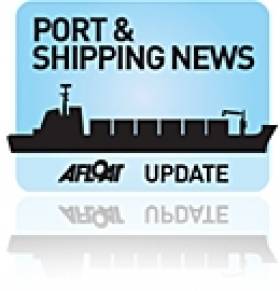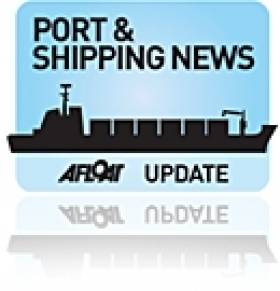Displaying items by tag: Harren & Partner
Cargoship to Attempt Second Ferry-Lift
In the first attempt to load the ferries last week, the Clann na nOileáin fell into the Dun Aengus Dock when the sling rope broke causing the French built 234-passenger craft to fall some 12m /40ft. Onboard the ferry were three people who were taken to hospital but were later released.
Thor Gitta is fitted with two deck-mounted cranes and this feature is also similarly found on the Patanal, which grounded in Casla Bay at the entrance to Rossaveal, nearly a fortnight ago. The German owned 7,002grt was the first vessel chartered to bring the fast-ferries from Rossaveal, but the ferries were subsequently sailed to Galway after the ship was refloated.
The 120m Patanal has undergone "underwater and internal inspections and repairs," according to Capt. Brian Sheridan, harbourmaster of Galway Port Company though he added "that the vessel would remain subject to an inspection by the Marine Survey Office before she can be released".
According to a statement released by the Patanal's owners, Harren & Partner, the vessel is then to be taken to dry dock in Bremerhaven for further repairs.
Since the incident the vessel has been at anchorage off Black Point on the Co. Clare side of Galway Bay where she was monitored initially for pollution and the tug Celtic Isle in attendance. The tug is operated by Celtic Tugs and is normally based in Foynes, Co. Limerick.
Inspection of Refloated Ship in Galway Bay Under Way
Marine surveyors are currently inspecting the German cargo ship which was refloated yesterday in Galway Bay after running aground early on Thursday.
The Irish Coast Guard confirmed to The Irish Times that no pollution had occurred in the grounding of the Pantanal on the south Connemara coast.
The 120m vessel was refloated at high tide yesterday morning with help from the Celtic Isle tug from Foynes in Co Limerick.
Ship managers Harren & Partner said the hull would undergo a diver inspection before the vessel sails for dry dock.
Yesterday Minister for the Marine Simon Coveney welcomed the "successful operation in very challenging conditions" and confirmed a thorough investigation of the incident by the Marine Casualty Investigation Board.
The ship had been sailing from the Mediterranean to Rossaveal to collect two monohull ferries, sold to Mauritius, that had been built to serve the Aran Islands route.
The Irish Times has more on the story HERE.






























































